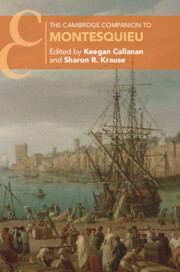Book contents
- The Cambridge Companion to Montesquieu
- Other Volumes in the Series of Cambridge Companions
- The Cambridge Companion to Montesquieu
- Copyright page
- Contents
- Contributors
- Acknowledgments
- Chronology
- Abbreviations
- 1 Montesquieu
- 2 Persian Letters
- 3 Considerations on the Romans
- 4 The Spirit of the Laws
- 5 Montesquieu and the Classical World
- 6 Montesquieu’s Guiding Principles and Foundations
- 7 Montesquieu on Virtue
- 8 Internationalism, Cosmopolitanism, and Empires
- 9 Liberty in Montesquieu
- 10 Political Sovereignty in Montesquieu
- 11 Montesquieu on Slavery
- 12 Montesquieu and the Liberty of Women
- 13 Political Economy
- 14 Religion and Politics
- 15 Constitutional History
- 16 Montesquieu and the Enlightenment
- 17 Montesquieu’s Liberal Legacies
- Bibliography
- Index
- Other Volumes in the Series of Cambridge Companions
15 - Constitutional History
Published online by Cambridge University Press: 23 February 2023
- The Cambridge Companion to Montesquieu
- Other Volumes in the Series of Cambridge Companions
- The Cambridge Companion to Montesquieu
- Copyright page
- Contents
- Contributors
- Acknowledgments
- Chronology
- Abbreviations
- 1 Montesquieu
- 2 Persian Letters
- 3 Considerations on the Romans
- 4 The Spirit of the Laws
- 5 Montesquieu and the Classical World
- 6 Montesquieu’s Guiding Principles and Foundations
- 7 Montesquieu on Virtue
- 8 Internationalism, Cosmopolitanism, and Empires
- 9 Liberty in Montesquieu
- 10 Political Sovereignty in Montesquieu
- 11 Montesquieu on Slavery
- 12 Montesquieu and the Liberty of Women
- 13 Political Economy
- 14 Religion and Politics
- 15 Constitutional History
- 16 Montesquieu and the Enlightenment
- 17 Montesquieu’s Liberal Legacies
- Bibliography
- Index
- Other Volumes in the Series of Cambridge Companions
Summary
This chapter offers an interpretation of Part VI of The Spirit of the Laws, the least-discussed and least-understood section of the book: The Spirit of the Laws and its purpose in the book. Part VI systematically unravels all of the various accounts of a unitary founding moment of a unitary French state, all the attempts to find an ancient legitimate principle that could dictate what lawful government would mean in the eighteenth century. Montesquieu rejected founding narratives in favor of evolutionary history and unplanned development; he connected that move to his rejection of legal uniformity in favor of pluralism. Montesquieu rejects all of the contemporaneous theories of political normativity grounded in foundings and origins – la thèse nobiliaire as much as la thèse royale, historical contractarianism as is found in the monarchomachs as much as both hypothetical contractarianism and Machiavellian-republican founding principles. He demonstrates the falseness and impossibility of all of these, rejecting them as incompatible with the pluralism and complexity of history, the contingency and accident that shaped the development of political authority.
Keywords
- Type
- Chapter
- Information
- The Cambridge Companion to Montesquieu , pp. 248 - 265Publisher: Cambridge University PressPrint publication year: 2023

